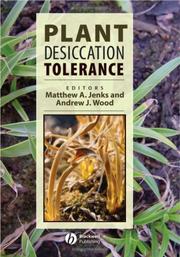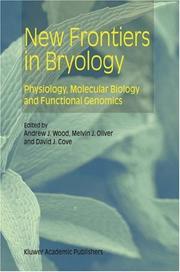| Listing 1 - 3 of 3 |
Sort by
|

ISBN: 9780813812632 0813812631 Year: 2007 Publisher: Ames, Iowa : Blackwell Pub.,
Abstract | Keywords | Export | Availability | Bookmark
 Loading...
Loading...Choose an application
- Reference Manager
- EndNote
- RefWorks (Direct export to RefWorks)
Plant desiccation tolerance is of great basic and applied scientific interest. Understanding plant responses and adaptations to severe desiccation is key to applying desiccation tolerance research to the improvement of economically important crops. Plant Desiccation Tolerance brings together a field of international researchers to provide a current review of the advances in plant desiccation tolerance research. The book is broken up into three sections: Vegetative Desiccation Tolerance; Desiccation Tolerance of Pollen, Spores, and Seeds; and Applications of Desiccation Tolerance Research. Completely up-to-date and written by leading desiccation experts, Plant Desiccation Tolerance will be of great interest to plant researchers and plant and crop science professionals.
Plant-water relationships. --- Plants --- Relations plantes-eau --- Plantes --- Drought tolerance. --- Adaptation. --- Résistance à la sécheresse --- Adaptation --- Résistance à la sécheresse
Book
ISBN: 9780813815022 Year: 2010 Publisher: Ames, Iowa : Wiley-Blackwell,
Abstract | Keywords | Export | Availability | Bookmark
 Loading...
Loading...Choose an application
- Reference Manager
- EndNote
- RefWorks (Direct export to RefWorks)
Crops --- Crop improvement --- Crops and climate --- Cultures, Effets du stress sur les --- Cultures --- Cultures et climat --- Effect of stress on --- Physiology --- Development --- Amélioration --- Physiologie --- Crop improvement. --- Crops and climate. --- Development. --- Effect of stress on. --- Physiology.

ISBN: 1402019963 9048165695 0306485680 Year: 2004 Publisher: Dordrecht : Springer Netherlands : Imprint: Springer,
Abstract | Keywords | Export | Availability | Bookmark
 Loading...
Loading...Choose an application
- Reference Manager
- EndNote
- RefWorks (Direct export to RefWorks)
The mosses (Bryophatea, Musci) are a diverse and widely distributed group of land plants. Mosses are attractive experimental plants because they exhibit the traditional attributes of good model systems (Le. ease of growth & maintenance, fast generation time, and amenable genetics) with the added advantage of a haploid gametophyte that allowed developmental mutants to be recovered with relative ease. In addition, mosses with the ability to tolerate extreme environmental conditions offer realistic models for the analysis of environmental stress-tolerance; particularly when compared to tracheophytes such as Arabidopsis thaliana in which these important plant phenotypes are either not clearly expressed or entirely lacking. And, in one of the most exciting developments in Plant Biology, efficient homologous recombination occurs in the moss Physcomitrella patens. The ability to perform efficient homologous recombination (Le. gene knock-outs) in P. patens is at present unique amongst all plants and represents an extremely powerful technique for the functional analysis of many plant genes. Over the past 5 years, a world-wide community of moss researchers has evolved. A highly successful "Moss" conference has been held annually (l998-Mumbai, India; 1999-Carbondale, IL, USA; 2000-Villars, Switzerland; 200l-0kazaki, Japan; 2002-Ambleside, UK; 2003-St. Louis, MO, USA) with "Moss 2004" planned to be held in Frieburg Germany. These conferences have been instrumental in the creation & development of strong collaborative ties, and the free exchange of both ideas and materials.
BRY Bryophytes --- physiology --- molecular biology --- genetics --- Physcomitrella patens --- phylogeny --- Nature. --- Environment. --- Plant science. --- Botany. --- Ecology . --- Plant physiology. --- Popular Science in Nature and Environment. --- Plant Sciences. --- Ecology. --- Plant Physiology. --- Botany --- Plants --- Physiology --- Balance of nature --- Biology --- Bionomics --- Ecological processes --- Ecological science --- Ecological sciences --- Environment --- Environmental biology --- Oecology --- Environmental sciences --- Population biology --- Botanical science --- Phytobiology --- Phytography --- Phytology --- Plant biology --- Plant science --- Natural history --- Ecology --- Floristic botany
| Listing 1 - 3 of 3 |
Sort by
|

 Search
Search Feedback
Feedback About UniCat
About UniCat  Help
Help News
News